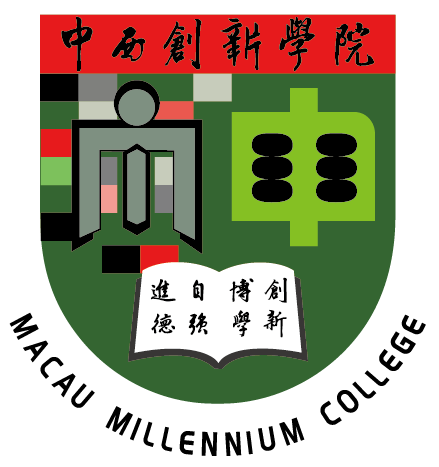The 2025 “Tourism+” Exchange Conference Successfully Held at Macau Millennium College
On 25 November 2025, the “Intelligent Integration of Tourism, Building the Future Together” High-Quality Development of Tourism Services in Macau–2025 “Tourism+” Exchange Conference was successfully held at Macau Millennium College (“MMC”). The conference was jointly hosted by MMC, the Macau Hoteliers & Innkeepers Association, and the Macau Tourism Development Think Tank, with Guangdong Nanbo Education Group and Macau Guo Yu Technology Limited as co-organisers. It also received sponsorship from the Education Fund of the Macao Special Administrative Region Government, the Macao Government Tourism Office (“MGTO”), and the Macao University of Tourism (“UTM”).
During the conference, the Research Centre for Sino-Luso Cooperation and Tourism Economics was officially established, and the Journal of Tourism Management Studies held its inaugural ceremony. Distinguished guests in attendance included Huang Zhihu, Deputy Director of the Research Office of the Liaison Office of the Central People’s Government in the Macao SAR; Li Yongle, Level III Division Rank Official of the Education and Youth Affairs Department of the Liaison Office of the Central People’s Government in the Macao SAR; Herbert Choi Cheong Hong, Acting Chief of the MGTO Organisational Planning and Development Department; Cheong Soung Un, Acting Chief of the Division of Tertiary Educational Cooperation and Exchange of the Education and Youth Development Bureau; Vong Chuk Kwan, Rector of UTM; Lee Koi Ian, a member of the Legislative Assembly and President of the Macau Youth Entrepreneur Association; Zhong Weihe, Rector of MMC; Cheung Kin Chung, President of the Macau Tourism Development Think Tank and the Macau Hoteliers & lnnkeepers Association, and Chairman of China Travel Service (Macao) Limited; Danny Chau, President of the Board of Directors, Sino-Luso Industry and Culture Exchange Promotion Association (Macao); Sun Jiuxia, Director of the Centre for Tourism, Leisure and Social Development Research and Executive Director of the Greater Bay Area Key Laboratory for Humanities Community at Sun Yat-sen University; Zhu Hong, School of Geography and Remote Sensing, Guangzhou University; Huang Hua, Assistant Rector of MMC; and Wang Xin, Dean of the Centre for Continuing Education and Executive Dean of the School of Business, MMC.
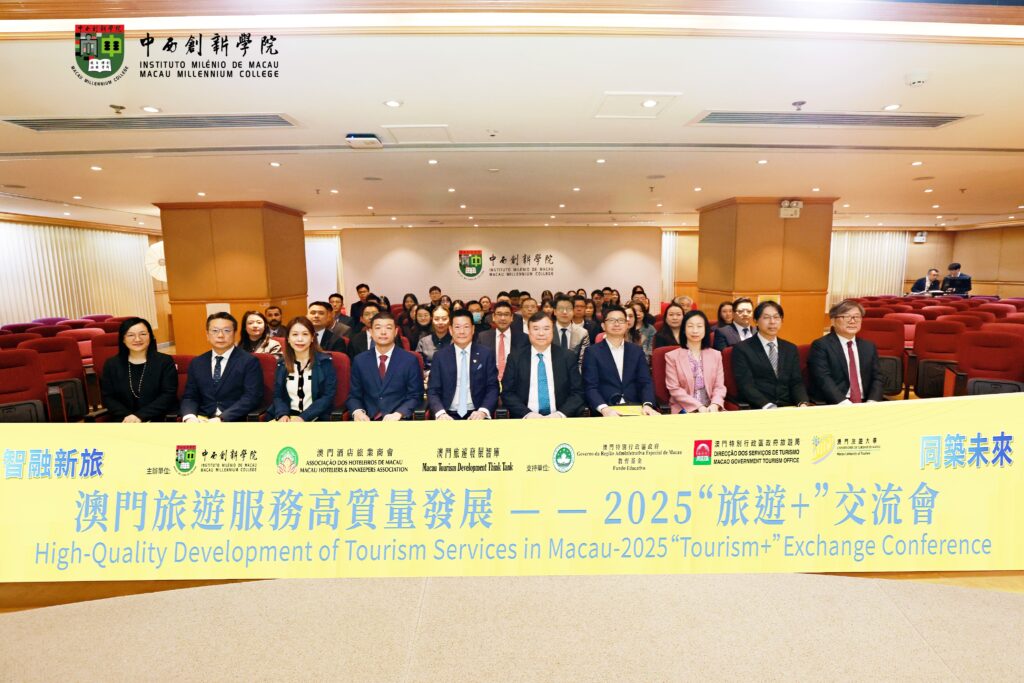
In his speech, Rector Zhong Weihe stated that, in the 24 years since its establishment, MMC has always adhered to its original mission, committed to supporting the high-quality development of Macao’s tourism industry, and has trained tourism and entertainment management talent with international vision, professional competence, and practical ability. This has provided strong momentum for the sustainable development of Macao’s tourism industry. Responding to Macao’s vision of becoming a World Centre of Tourism and Leisure, MMC has actively advanced its curriculum in smart tourism and entertainment management, established the Research Centre for Sino-Luso Cooperation and Tourism Economics, and launched the Journal of Tourism Management Studies. Through the dual drivers of research and talent development, MMC aims to further empower the upgrade and innovation of Macao’s cultural tourism industry.
Looking ahead, MMC will continue to develop the “Tourism+” Exchange Conference into a platform with a unique style and distinct features, aiming to make it an influential flagship event in Macao’s tourism sector. Leveraging this platform, MMC will also strengthen the collaboration between industry, academia, and research, attract greater international attention to Macao, and contribute to Macao’s growth into a World Centre of Tourism and Leisure while supporting the SAR government’s strategy for moderate economic diversification.
At the establishment ceremony of the Research Centre for Sino-Luso Cooperation and Tourism Economics, Huang Zhihu, Cheong Soung Un, Zhong Weihe, Herbert Choi Cheong Hong, Lee Koi Ian, Michael Gou, Danny Chau, and Xu Zhenni jointly unveiled the research centre.
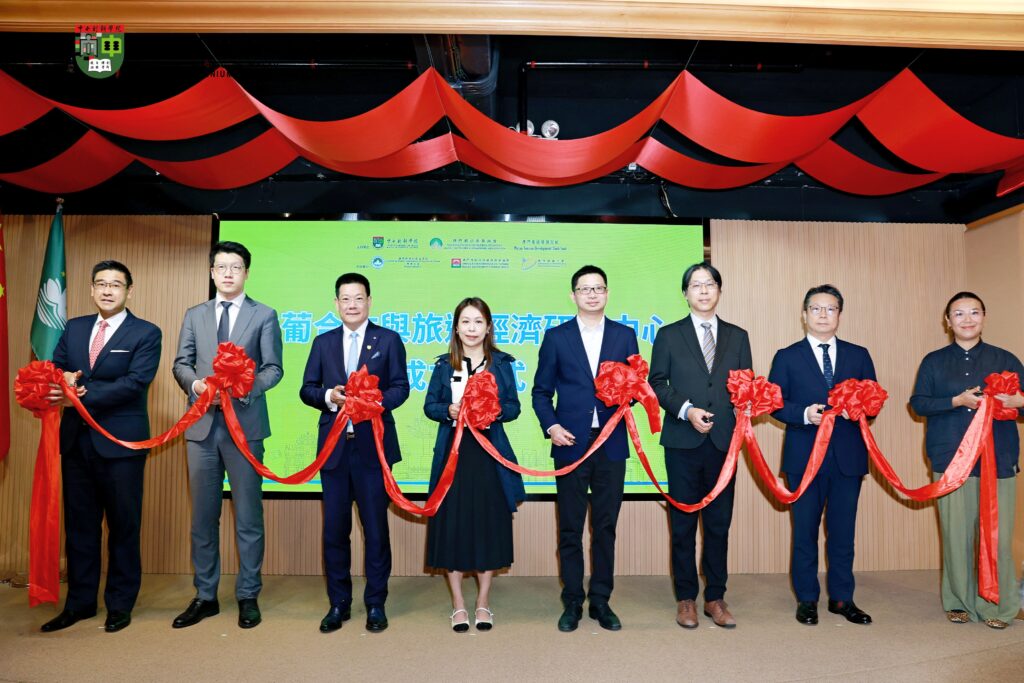
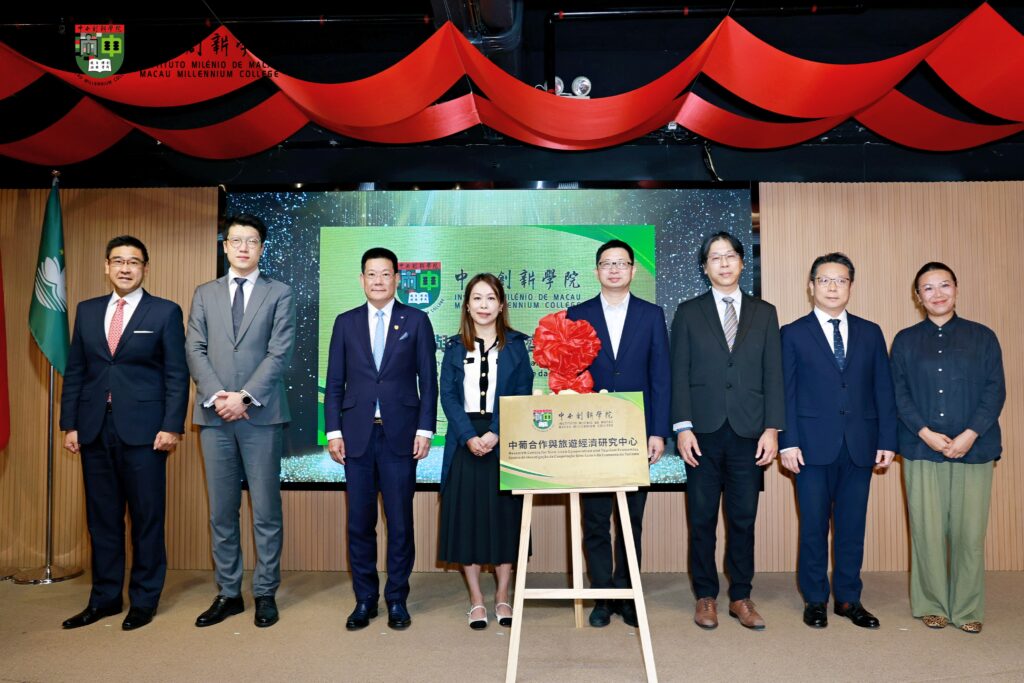
The inaugural issue of the Journal of Tourism Management Studies was officially released to an enthusiastic academic audience, with Professor Zhong Weihe, Editor-in-Chief Zhu Hong, and Deputy Editor-in-Chief Sun Jiuxia jointly unveiling the first issue.
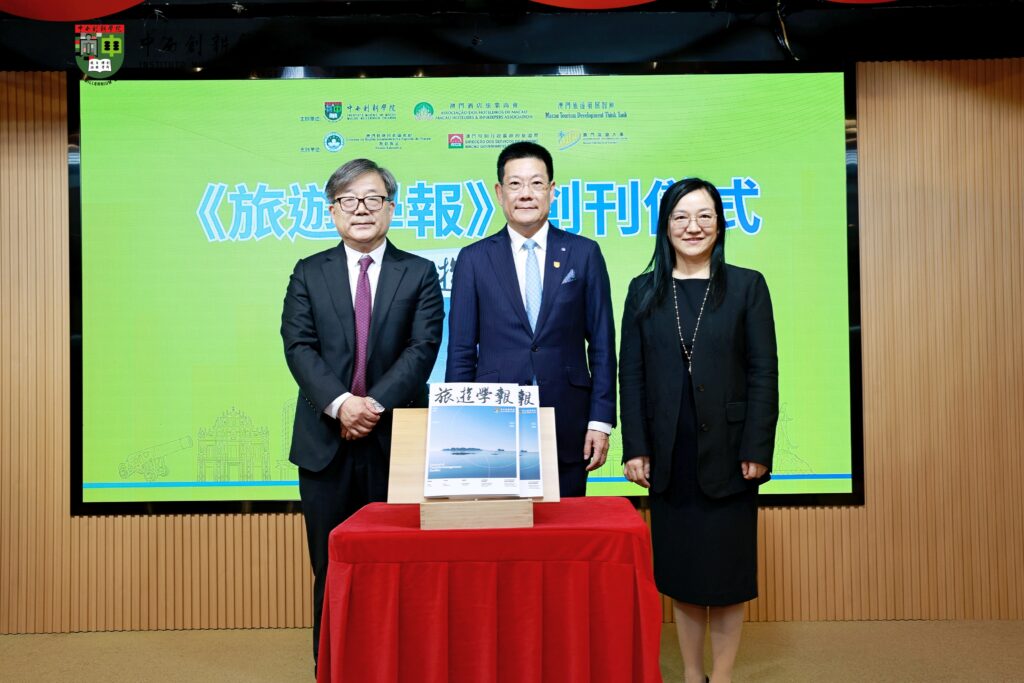
Academic research and industry practice are mutually reinforcing. In response to Macao’s “Tourism+” integrated development, and to actively cultivate local talent in performing arts technology, MMC has teamed up with Galaxy Entertainment Group to launch the “Introduction to Stage Engineering” training course. The course attracted a large number of industry practitioners and enthusiasts. At the exchange conference, Huang Hua, Assistant Rector of MMC, presented a cooperation certificate to Ms Xu Zhenni, Vice President of Operations, Galaxy Entertainment Group, marking the successful outcome of this training initiative.
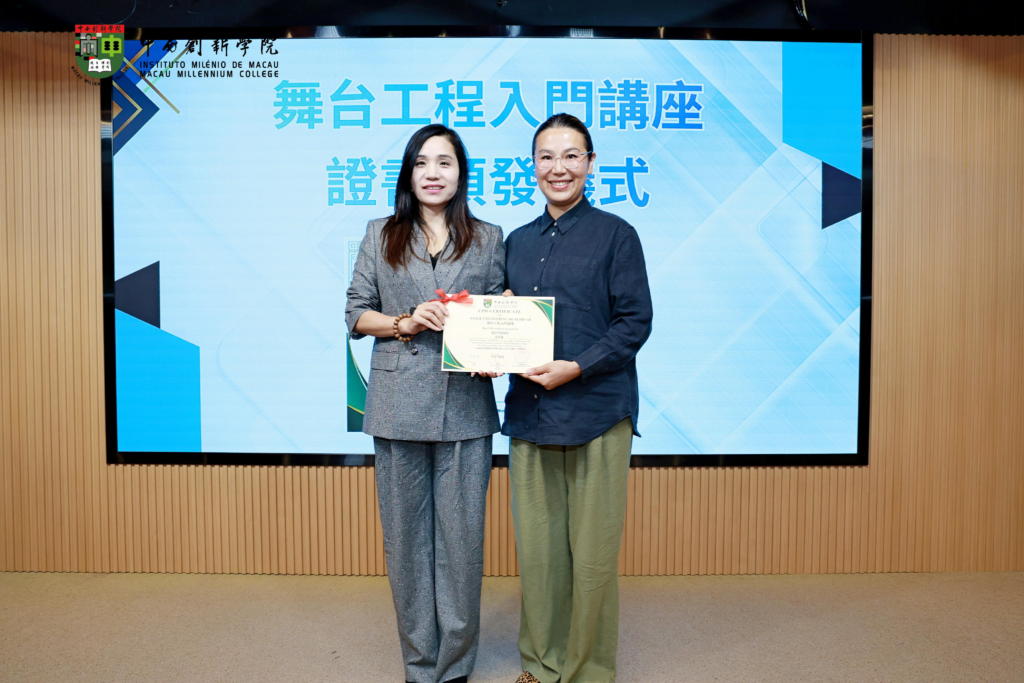
The keynote speech session, chaired by Dean Wang Xin, brought together speakers who explored a wide array of forward-looking topics. Their discussions covered the strategic role of China–Portugal cultural tourism cooperation in Macao’s economic diversification, innovations in “Tourism+” integration models and pathways for expanding international visitor markets, communication strategies and practices for cultural tourism in the media age, the influence of localized “foodification” on tourism consumption, applications of smart technologies in tourism membership marketing, and mechanisms for collaboration between the performing-arts industry and the tourism economy.
In his speech, Cheung Kin Chung emphasised that Macao’s tourism industry should focus on “integration” and “innovation”, achieving industrial upgrading through “Tourism+Technology” and “Tourism+Green”, while deepening cross-sector collaboration between cultural tourism and finance. The goal is to promote appropriately diversified economic development. Vong Chuk Kwan, in her speech titled “Opportunities of Strengthening Internal and External Connectivity in Macao’s Cultural Tourism”, shared insights into deepening regional cooperation and expanding international connections. She pointed out that cultivating professional talent with digital literacy and international vision is key to seizing these opportunities. Sun Jiuxia outlined new paradigms for local renewal driven by cultural tourism integration. Drawing on the theory of “foodification”, Professor Zhu Hong used local culinary case studies to reveal how food can reshape a destination’s cultural identity. Michael Gou shared innovative practices in smart tourism and membership marketing, whilst Ms Xu Zhenni analysed the development pathways through which the performing-arts sector is emerging as a new engine for tourism growth.
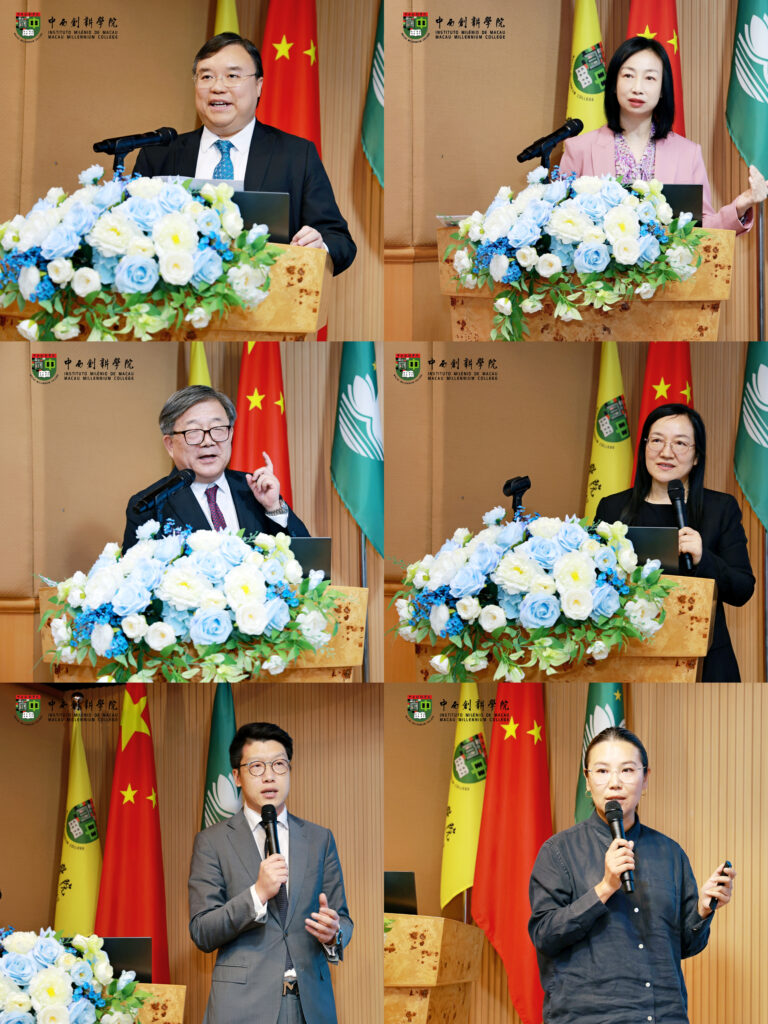
Attendees noted that the future of Macao’s tourism industry requires both deepening the city’s unique blend of Chinese and Western cultural resources and highlighting its distinctive local character. They emphasised the importance of leveraging China–Portugal cooperation platforms and digital technologies, seizing new opportunities such as “Multi-destination” promotion and engagement with younger visitors, and addressing the challenges of cross-regional collaboration to drive sustainable and innovative growth in the tourism sector.

